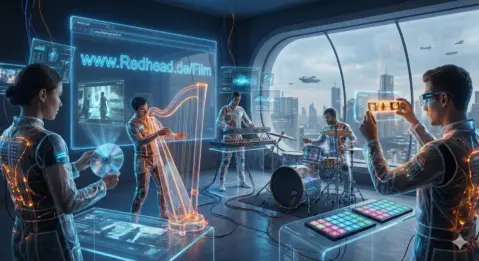Soundtracks
Soundtrack
Die Macht der Klänge – Wie Filmmusik das Science-Fiction-Erlebnis formt
Filmmusik ist weit mehr als bloße Begleitung bewegter Bilder – sie ist das emotionale Fundament eines jeden filmischen Erlebnisses. Besonders im Science-Fiction-Genre, wo visuelle Welten oft weit jenseits unserer Realität liegen, übernimmt Musik eine entscheidende Rolle: Sie übersetzt das Unbekannte in etwas Spürbares, macht das Fremde vertraut und verleiht dem Visuellen eine Seele. Der Klang des Unbekannten
Science-Fiction-Filme erzählen von Zukunft, Fortschritt, künstlicher Intelligenz und den Abgründen der Menschheit – Themen, die oft schwer greifbar sind. Hier tritt die Musik als Brücke zwischen Zuschauer und Vision auf. Synthesizer, elektronische Texturen oder sphärische Soundlandschaften erschaffen Klangräume, die das Publikum in ferne Galaxien oder virtuelle Realitäten versetzen. Ob das metallische Pochen eines Maschinenherzens oder die unendlichen, hallenden Flächen eines fernen Planeten – der Klang definiert die Atmosphäre. Schon wenige Töne können genügen, um einen Zuschauer in den Kosmos des Films zu ziehen.
Emotion und Technologie
Das Spannungsfeld zwischen Menschen und Maschine ist eines der zentralen Themen in der Science-Fiction. Diese Dualität spiegelt sich auch in der Musik wider. Elektronische Klänge symbolisieren das Technologische, Künstliche – orchestrale Elemente hingegen das Menschliche, Emotionale. Wenn beide miteinander verschmelzen, entsteht jener unverwechselbare Sound, der Filme wie Blade Runner, Interstellar oder Ex Machina prägt. Hier wird Musik zur Sprache des Dazwischen: Sie lässt uns fühlen, was rational nicht erklärbar ist – Sehnsucht, Einsamkeit, Ehrfurcht oder Furcht vor dem Unbekannten.

Die unsichtbare Erzählung
Gute Filmmusik erzählt, ohne selbst im Vordergrund zu stehen. Sie steuert Emotionen, lenkt den Blick und verleiht Szenen Bedeutung. In Science-Fiction-Filmen, in denen die Handlung oft von Effekten, Technologie und visueller Opulenz dominiert wird, ist sie das unsichtbare narrative Element, das Struktur und Tiefe verleiht. Ein stilles Thema im Hintergrund kann mehr über den inneren Konflikt einer Figur verraten als jedes Dialogwort. Wenn die Kamera ins All schwenkt und nur ein leises, melancholisches Motiv erklingt, verstehen wir – selbst ohne Worte – die Einsamkeit des unendlichen Raums.
Von der Stille zur Wucht
Auch Stille ist Teil der Musik. In vielen modernen Sci-Fi-Filmen spielt das Wechselspiel zwischen Ton und Stille eine zentrale Rolle. Der abrupte Kontrast zwischen ohrenbetäubender Explosion und lautloser Leere verstärkt die emotionale Wucht einer Szene. Die Abwesenheit von Musik schafft Momente reiner Spannung – und macht das anschließende musikalische Crescendo umso mächtiger.
Filmmusik als Identität
Jeder große Science-Fiction-Film hat seine akustische Signatur: die synthetischen Drones von Arrival, die gewaltigen Orgelklänge von Interstellar, die minimalistische Elektronik in Tron: Legacy oder die orchestrale Macht der Star Wars-Saga. Diese musikalischen Sprachen prägen nicht nur die Filme selbst, sondern das gesamte Genre. Sie sind Erinnerungsanker – Melodien, die im Gedächtnis bleiben und das Gefühl des Staunens, der Faszination und der Unendlichkeit wachrufen, das nur Science-Fiction erzeugen kann.
Fazit
Filmmusik in Science-Fiction ist kein Beiwerk, sondern das emotionale Rückgrat eines Genres, das von Visionen lebt. Sie übersetzt Technik in Gefühl, Zukunft in Gegenwart und Stille in Bedeutung. Ob synthetisch oder symphonisch – die Musik ist der Pulsschlag der Zukunft, der uns im Kino, im Serienformat oder in der Animation das Unmögliche erleben lässt. Sie ist die unsichtbare Energie, die Bilder mit Emotion füllt – und aus Science-Fiction wahre Filmkunst macht.
Filmmusik in Science-Fiction ist kein Beiwerk, sondern das emotionale Rückgrat eines Genres, das von Visionen lebt. Sie übersetzt Technik in Gefühl, Zukunft in Gegenwart und Stille in Bedeutung. Ob synthetisch oder symphonisch – die Musik ist der Pulsschlag der Zukunft, der uns im Kino, im Serienformat oder in der Animation das Unmögliche erleben lässt. Sie ist die unsichtbare Energie, die Bilder mit Emotion füllt – und aus Science-Fiction wahre Filmkunst macht.

The Power of Sound – How Film Music Shapes the Science Fiction Experience
Film music is far more than a mere accompaniment to moving images – it is the emotional foundation of every cinematic experience. Especially in the science fiction genre, where visual worlds often lie far beyond our reality, music plays a crucial role: it translates the unknown into something tangible, makes the strange familiar, and gives the visual a soul.
The Sound of the Unknown
Science fiction films tell stories of the future, progress, artificial intelligence, and the abysses of humanity – themes that are often difficult to grasp. Here, music acts as a bridge between the viewer and the vision. Synthesizers, electronic textures, and atmospheric soundscapes create sonic spaces that transport the audience to distant galaxies or virtual realities. Whether it’s the metallic pulse of a machine’s heart or the vast, echoing surfaces of a distant planet – sound defines atmosphere. Just a few notes can be enough to draw the viewer into the film’s universe.
Emotion and Technology
The tension between human and machine is one of the central themes of science fiction – and it is reflected in the music. Electronic sounds symbolize technology and artificiality, while orchestral elements express humanity and emotion. When the two merge, that unmistakable sound emerges – the sound that defines films like Blade Runner, Interstellar, or Ex Machina. Here, music becomes the language of what lies in between: it allows us to feel what cannot be rationally explained – longing, loneliness, awe, or fear of the unknown.
The Invisible Narrative
Good film music tells a story without taking center stage. It guides emotions, directs attention, and gives scenes meaning. In science fiction films, where the narrative is often dominated by effects, technology, and visual grandeur, music is the invisible narrative element that provides structure and depth. A quiet theme in the background can reveal more about a character’s inner conflict than any spoken line. When the camera pans out into space and only a soft, melancholic motif plays, we understand – even without words – the loneliness of the infinite void.
From Silence to Impact
Silence is also part of music. In many modern sci-fi films, the interplay between sound and silence plays a central role. The sudden contrast between a deafening explosion and total quiet intensifies the emotional impact of a scene. The absence of music creates moments of pure tension – making the subsequent musical crescendo all the more powerful.
Film Music as Identity
Every great science fiction film has its acoustic signature: the synthetic drones of Arrival, the majestic organ sounds of Interstellar, the minimalist electronics of Tron: Legacy, or the orchestral power of the Star Wars saga. These musical languages shape not only the films themselves but the entire genre. They are memory anchors – melodies that stay with us, evoking the sense of wonder, fascination, and infinity that only science fiction can create.
Conclusion
Film music in science fiction is not an accessory – it is the emotional backbone of a genre built on vision. It translates technology into feeling, the future into the present, and silence into meaning. Whether synthetic or symphonic – music is the heartbeat of the future, allowing us to experience the impossible in cinema, television, or animation. It is the invisible energy that fills images with emotion – and turns science fiction into true cinematic art.


